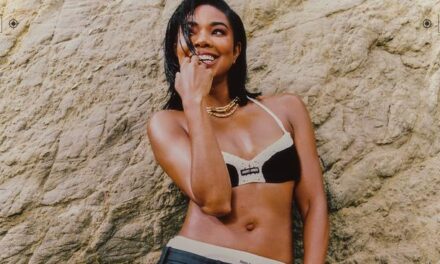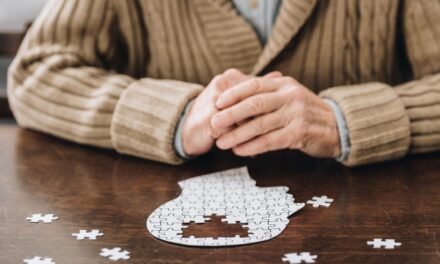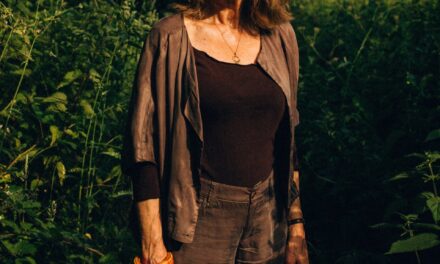As she approaches her fourth and final World Cup, the USWNT star is fiercely proud of everything she’s accomplished. But she’s also eager to discover what retirement will bring. “I can’t wait to be untethered,” she says.

Jonathan Bartlett
Megan Rapinoe is ready to talk about the end.
We’re two hours into breakfast at one of Rapinoe’s favorite spots, Lola, on a muggy day in the Pacific Northwest. The smell of bacon, eggs, and fresh donuts wafts in from the kitchen. This place is everything you’d expect from an unassuming diner—except for Rapinoe, clad in Cobain-inspired vintage frames, red leather pants, and black Chuck Taylors, sitting across from me in a center booth.
Rapinoe is a month into her 10th NWSL season for the OL Reign, and trying to muster every ounce of soccer from her 38-year-old body in preparation for the 2023 World Cup. Before the food arrives, we make small talk about clothes, music, and her disappointment in the Warriors after their second-round playoff loss to the Lakers. But eventually, our conversation turns to the future.
“This is going to be my last season,” she tells me, between nibbles of a donut covered in vanilla mascarpone. “I’m going to be done-done.”
Rapinoe publicly confirmed her decision to retire eight weeks after our meal, at a press conference down the coast in San Jose, California, before her final international competition on American soil, which 40 of her family and friends attended. She will play this year’s World Cup in Australia/New Zealand, finish the NWSL season, then hang up her cleats for good.
When she does, it will mark the end of a decorated professional career that has sent her across the globe and earned her accolades and trophies, including two World Cup titles so far. It has given her a platform to speak up for causes she’s passionate about, which in turn has incurred the wrath of a sitting U.S. president and garnered her a level of fame she never could have imagined. Over five days, we discussed all of it: The defining moments of her soccer career, the most difficult stretches, and the upcoming tournament that will cap off her tenure with the national team. But Rapinoe was most interested in talking about the unknown, her future, and the exhilaration she feels about moving on from the longest relationship of her life.
“I can’t wait to be untethered,” she says. “And be able to take trips, and do stuff, and move on, or move to a different area in my life. But I’m also like, this is so much fun. I’m still good. I still play on a really good team. I’m still on the national team. I think having the World Cup is also just something big, hopefully, knock on wood, to go out with. I’m just like, this is fun.”
Rapinoe figures her life after athletics will provide the freedom to pursue all she has put aside over the last two decades. Late last year, along with her fiancée, Sue Bird, she started a production house geared toward amplifying underrepresented voices. She wants to focus on her business endeavors and one day own a professional women’s soccer team, but also find time to remodel her home and travel recreationally. “I want to go to Italy for a month,” she says. “It’d be so nice.” She is eager to live a life that encompasses all her urges.
“I never had the struggle of turning soccer off. I was ready to turn it off,” she says. “It takes up so much of my life that I have always been interested in doing other things. I think it started even when I was younger. I loved playing basketball, I loved doing other sports. I played the guitar growing up. I was interested in other things and it was never … Honestly, I probably could have put a little more effort into soccer.”
This week, Rapinoe will make her final appearance on soccer’s biggest stage, the tournament where she became a household name. In 2019, as the USWNT was engaged in a bitter lawsuit with the U.S. Soccer Federation over equal pay (which resulted in a $24 million settlement in 2022), Rapinoe scored six World Cup goals and won the Golden Boot. This year, she is expected to fulfill more of a supporting role, as a new generation takes the baton for the women’s national team.
As she seeks her third straight World Cup title, Rapinoe is fiercely proud of everything she and her teammates have accomplished. “We were so fucking good. We won a lot. We totally and completely changed the game, off the field, forever,” she says.
And yet, she embraces the end with a sort of serenity. “I want those kids to almost … not push us out,” she says. “But I’m like, ‘I want you to be the next.’ This is how this team works. It’s always the next one up.”
Two days after breakfast, Rapinoe returns to her and Bird’s Seattle home after a long day of practice with the Reign. She plops on the couch, connects her phone to a bluetooth speaker, and opts for a playlist that features several cuts from Frank Ocean’s Blonde, the soundtrack of their love story.
“It came out right as we were getting together,” Rapinoe tells me, blushing. “The transition and all the stuff Frank was going through, you could feel that tension in there. And I think that was there for us.”
The record grapples with themes of heartbreak, transition, and duality, all of which describe Rapinoe’s life in 2016. In September of that year, she knelt during the national anthem in solidarity with Colin Kaepernick, which provoked an international outcry. “She was getting booed,” Bird says. “I think that was really a shock for her.” Amid the fallout, following a disagreement with manager Jill Ellis, Rapinoe was left off the national team’s winter roster, which sent her into a dark place. And on top of all that, Rapinoe was navigating a breakup with her longtime partner Sera Cahoone.
In her 2020 memoir, One Life, Rapinoe wrote that there was no “physical overlap” between her relationships with Cahoone and Bird, but admitted to an “emotional one.” Bird and Rapinoe met during a photo shoot in the lead-up to the 2016 Summer Olympics in Brazil, and after the Games the pair swapped googly eyes at the wrap party. By fall, they were inseparable, hanging all around Seattle.
Mornings were spent at Lola, where the two shared hearty breakfasts. Late afternoons were at Betty, a vibey bar near Sue’s place. And evenings were dedicated to talks on the couch, where they would bare their souls into the wee hours of the morning. Rapinoe was smitten, and Bird was cautiously falling for her new friend.
“I mean the one thing she said, she’s like, ‘Just don’t fadeaway me. Don’t fadeaway jumper me. Just tell me,’” Rapinoe recalls. “For her to show up and just be that vulnerable, and that calm and confident was something that really felt safe.”
Rapinoe soon moved into Bird’s condo in Seattle’s affluent Queen Anne neighborhood, where they began the process of integrating their lives. Bird, a proponent of gluten-free living, began changing Rapinoe’s diet, and including her in offseason workouts, including pickup basketball games that sometimes went too far.
“She fouls like a motherfucker,” Bird tells me. “It’s ridiculous.”
“There was one time where we played one-on-one, kind of, sort of jokingly. We’ve never done anything like that seriously. We’re laughing the whole time,” Bird says. “And by the way, I’m not a one-on-one, break-you-down person, but I happen to do whatever, and I got by her. And I’m just like, ‘la-la-la’ going up for this layup. Boom, she pushes me in the back.”
“Oh, my God,” I respond, enthralled. “Did y’all have a Love & Basketball moment?”
“Maybe for her,” Bird retorts. “I was appalled.”
In the midst of the competitiveness, Rapinoe was unlocking a side of Bird that the latter had spent a lifetime trying to find. When Bird entered the WNBA in 2002, she felt pressure to conform to traditional norms and beauty standards. “I was in this weird, ‘Do I dress [like] a girl? Do I dress feminine because that’s what I feel like I’m supposed to do?’” Bird says. “But I feel really uncomfortable in this jean skirt. And I think Megan was just like, ‘The more you dress how you feel, the more your true self is going to show.’”
Last summer, when Rapinoe went to the White House to receive the Presidential Medal of Freedom, Bird accompanied her boo in a gray-striped three-piece suit with matching white boots, threatening to overshadow the woman of the hour.
“She saw me before I saw me,” Bird says.
In 2020, Rapinoe sat out the NWSL Challenge Cup to shack up with Bird in the WNBA’s pandemic-induced bubble in Florida. She spent mornings training on the track. “It was fucking a thousand degrees outside,” she says. “And then at night, there were all these bugs.”
The two shared a small hotel room, stepping over each other to participate in video calls for interviews and sponsorship obligations. In between Bird’s games, they talked about the future. Prior to the pandemic, Bird had flirted with the idea of retiring, and Rapinoe’s sabbatical from soccer made her a useful sounding board.
“Things like, ‘All right, so if I play one more year, two more years in the WNBA, what does that give me? What do I gain from that, versus starting my other life?’” Bird says. “There’s all kinds of questions that I had to ask myself, all kinds of questions that she helped me process.”

As Bird contemplated her professional future, Rapinoe was already making plans for their lives together as a couple. After Bird’s Seattle Storm won the title, Rapinoe, Bird, and a few family members and friends boarded a jet to Antigua to unwind by the pool. But Rapinoe had something else up her sleeve.
During a lull in the activities one afternoon, Rapinoe left the group. “She must have been going either to the bathroom, or to get something to drink,” Bird says. “I don’t remember. She comes back, and I don’t know how to explain this, but the second she turned the corner and approached me, there was something purposeful about it.”
Rapinoe then got on one knee, and asked Bird to marry her. After a prompt yes, Rapinoe pulled one of several rings off her hand and placed it on Bird’s left index finger, stamping their engagement.
“She had this bucket hat on, and I could tell my friends were all taking pictures,” Bird remembers. “I was like, ‘Take the bucket hat off.’”
The engagement marked a full-circle moment for Rapinoe. Eight years ago, Cahoone asked Rapinoe to marry her, and Rapinoe said yes. In hindsight, she says she wasn’t prepared for that level of commitment.
“I think I felt like a little maybe caught up,” Rapinoe admits. “And I want to be careful not to say anything negative towards Sera, because it wasn’t that. I think she was more ready for it, and I didn’t really know how to say no, because things were good. But then I wasn’t really at that point. But then she asked. And so it was like I just think I wasn’t mature enough, or emotionally mature enough to really understand what that meant.”
I ask Rapinoe what Bird has taught her about love.
“Well, how much capacity she has for it,” she responds. “That it’s not just something that happens. It’s something that you care for, and tend to, and cultivate. It is painful sometimes. It’s so challenging. I think it challenges you as a person. I think especially everything we’re told in our society about how love happens, and how it works, and how it is, is totally wrong. You don’t just fall in love and you meet your person, they complete you, and then you start your life and you live happily ever after. It’s just so dumb.”
Nearly three years later, the couple still hasn’t made their nuptials official. “We haven’t gotten married yet,” Rapinoe says. “Honestly, neither of us really wanted to take it on while we were playing. It’s just so much to plan and it’s like, ‘Oh my God.’ Even just going through the process of remodeling our apartment and all the planning and this and that, it’s a lot. We didn’t really have the capacity to do it.”
To avoid repeating mistakes each has made in previous relationships, Bird and Rapinoe have begun couples counseling, speaking honestly in sessions about their past, present, and future, in hopes of building something long-lasting.
“I think we have a tremendous amount of love, a very deep love,” Rapinoe says. “We care for each other so much, but it does, it takes more than that. It takes you being a full human yourself. It takes you being healed yourself … You’ve got to understand yourself better. At least for myself, I know getting to know myself better, so then I can show up as whole, and I can show up not committing the same patterns.”
Four years ago, Bird decided to freeze her eggs in hopes of one day having a child.
“We do these little check-ins. We’re like, ‘How are we feeling about kids now? How are we feeling about kids now?’” Rapinoe says. “And I think I never wanted kids while I was playing, and I don’t really want them right after I’m playing. Like, I need some time. And I feel like I’ll become a parent if that’s something that’s missing or not. But it’s not a huge pull right now. I think our lives are so busy.”
Which brings us back to retirement. Rapinoe is eager to travel the world and build a life with Bird in a way she hasn’t been able to due to the demands of her soccer career. Recently, the couple bought an apartment in Lower Manhattan, complete with marble finishes, a clear glass dining table, wraparound couches, and the vibe of Studio 54, matching the eclectic world Rapinoe has spent almost 40 years manifesting.
Last April, Rapinoe flew to Dallas for a night to watch Bird call an alternate broadcast of the women’s Final Four alongside Bird’s best friend Diana Taurasi. Throughout the evening, Rapinoe hung out, chatted, and recorded all the festivities on a vintage camcorder. It was Sue’s night, and Rapinoe relished being by her side, sharing an evening of laughs, jokes, and good company. These are the kinds of moments Rapinoe is most excited about in her next chapter. To set aside the all-consuming, single-mindedness of being a professional athlete, and enter a new world with the woman of her dreams.
“I’m the best WAG ever,” Rapinoe says. “I love being a WAG. It’s badass. It’s great. I love being with Sue. I love supporting her. I love seeing her do her stuff. I always loved going to her games. I just love being able to be on the other side of it and do something different.”
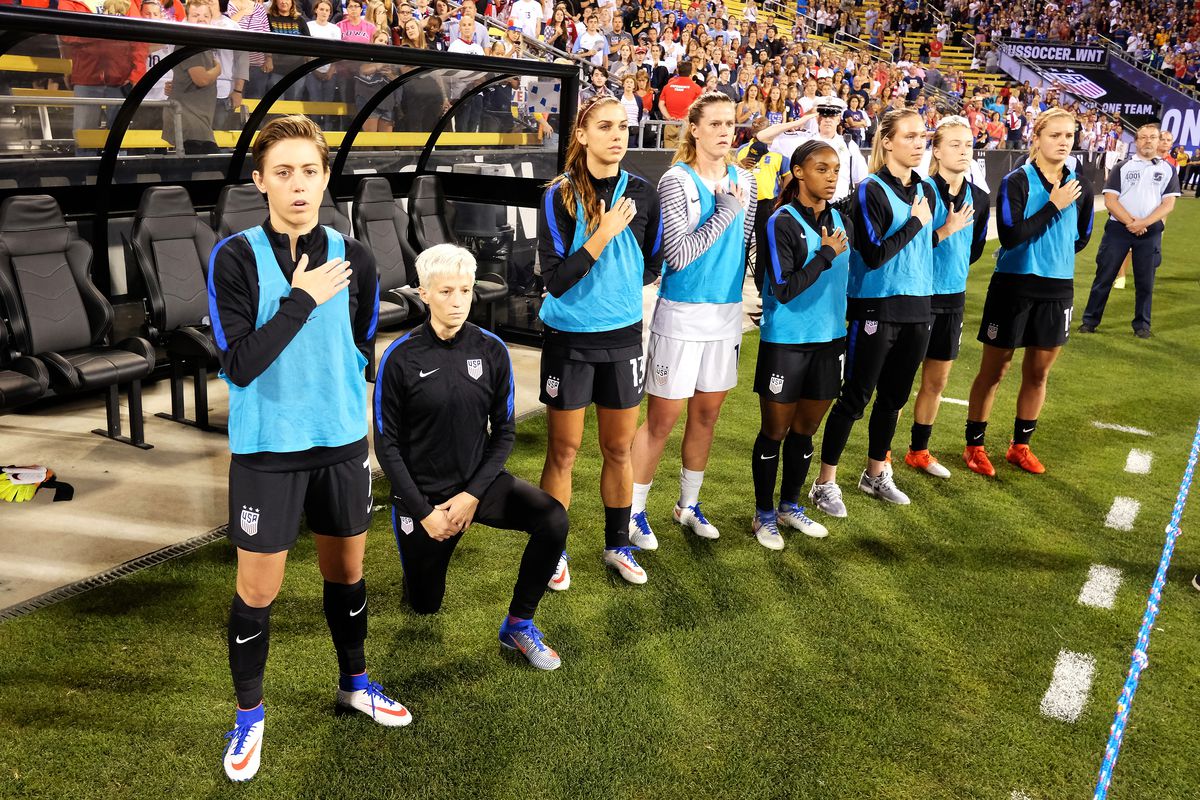
Rapinoe’s activism is as central to her career as her many accolades and achievements. She traces its origins to her freshman year at the University of Portland, when she came out to her teammates as gay. She followed suit publicly in 2012 with a feature in Out magazine, a decision she described as liberating and credited for giving her the confidence to speak openly about things other than soccer.
In 2016, Rapinoe kneeled prior to an international friendly against Thailand in solidarity with Kaepernick, who’d kneeled at NFL games earlier that year to bring awareness to police brutality. The backlash to her protest made Rapinoe feel isolated and abandoned by the federation, but the action of kneeling provided her with even greater resolve.
“It made a purpose clear for me,” she says. “I never have felt like soccer was just the point, and it was always something I was really good at. Even playing in World Cups and doing all that, I’m just like what else is there? And I feel like that moment gave me a real clarity.”
Before 2016, Rapinoe felt overwhelmingly supported in her activism. She rarely received negative feedback. But the reaction to her kneeling to protest racist policing and police brutality showed Rapinoe that the world was bigger than the bubble in which she’d existed. She realized that if she was going to be a national voice, she’d better have the knowledge and understanding to back up her words, as well as the fortitude to withstand the response. “She almost shifted her energy,” says Bird. “To get as educated as possible, as knowledgeable as possible, in order to be able to talk about why she knelt, the things happening in our country.”
The turbulent aftermath of her decision to kneel did nothing to deter Rapinoe’s activism. Instead, it gave her a greater understanding of what it takes to enact change. In 2019, Rapinoe, along with the rest of the women’s national team, sued the U.S. Soccer Federation for equal pay between men and women. Two years later, she went before Congress to discuss pay inequities women face in the workforce. And this spring, she and 39 other athletes sent a letter to House lawmakers to oppose the Protection of Girls and Women in Sports Act, which would bar trans female athletes from participating in girls and women’s sports. The combination of Rapinoe’s activism and her on-the-pitch exploits has made her perhaps the most prominent gay athlete in the country, and a leading voice for change on a variety of social issues.
Last summer, Rapinoe became the first soccer player to be presented with the Presidential Medal of Freedom, the highest government honor for an American civilian. Kaepernick, who inspired Rapinoe’s actions and didn’t play another NFL season after 2016, has never been to the White House. “It’s a little conflicting for me,” Rapinoe says. “This is a more palatable version of the things that are being said, that people feel comfortable with. … Imagine if Biden honored Kaep.”
Rapinoe feels the tension of being a white woman and a prominent voice on issues that disproportionately impact Black and Brown people, but is working toward an understanding of how to best use her voice.
“I think on the whole, it’s still doing more good,” she says. “Because I think I approach [my] privilege as how big of a hammer do I have? I think I am able to be in spaces or [have] different people listen to me or I can present something in a way that, because of the way I look or who I am, they’ll accept it more maybe, but then not shying away from saying the things that need to be said. Using it as leverage and as a hammer, more than letting the privilege protect myself.”
Rapinoe will soon move on from soccer, but she has no plans to move on from her activism. Last year, she and Bird started a production company, A Touch More, whose mission is to tell stories by queer people and people of color. And whether she is playing professionally or not, Rapinoe will always speak her mind. A week prior to our interview, Indiana became the latest state to ban gender-affirming care for minors, continuing a wave of anti-trans legislation that has coincided with a rise in violence toward trans people.
Rapinoe thinks back to when she came out during her freshman year, and how liberating it was to feel like she was finding herself.
“It’s just so sad and I think just going through the process of coming out or realizing that I was gay and like, ‘Oh, that’s a huge part of me that didn’t make sense before and the world didn’t totally make sense,’” she says. “And then when I figured that out, I was like, ‘Oh, the thing clicked in and the world made so much more sense.’ It’s like, ‘Why should people just have to literally be miserable their whole lives, just so you feel fucking comfortable, so they can wear a dress instead of pants?’”
Conservative lawmakers have used sports to further target trans people, and at least 20 states have imposed restrictions on transgender athletes.
“God forbid a trans person be successful in sports,” Rapinoe says of their efforts. “God forbid somebody dominate, then what are we going to do? Is the whole world going to crumble? And it’s like, I can tell you: I’ve won everything and it’s not the most important thing. It’s just not. For all these people who think that it is, who haven’t actually done anything and are not at the highest level, I’ve won. I’ve lost. I’ve done it all and it’s not more important than anybody’s humanity.”
As Rapinoe talks, I can’t help but wonder whether she would ever pursue a career in politics. “I’ve had the thought,” she says. “I’ve just been asked so many times I’ve been forced to think about it.”
But then she remembers all her plans for retirement, and shuts down the concept altogether, content to remain an activist rather than embark on another demanding career.
“Yeah, I do want to live my life,” she says. “Probably selfishly I just am like, ‘That seems like a lot.’”
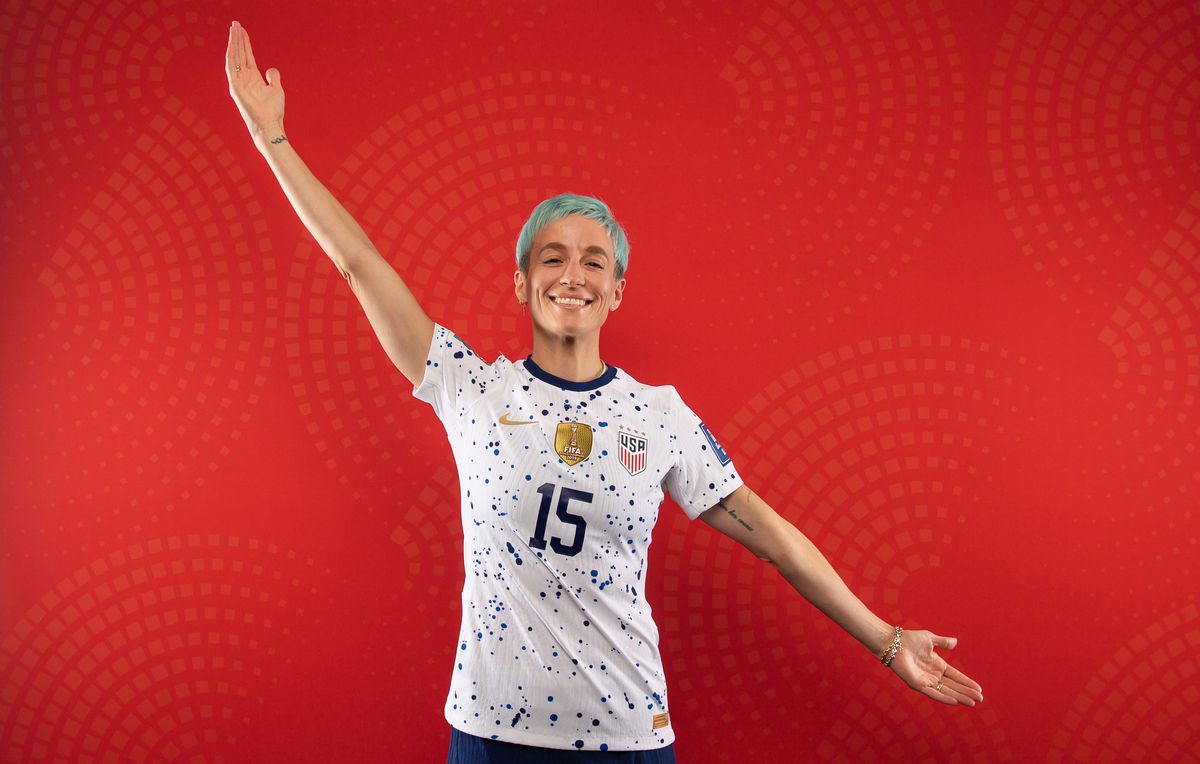
Photo by Hannah Peters – FIFA/FIFA via Getty Images
On Friday, Rapinoe will begin the final World Cup of her professional career when the U.S. opens the group stage against Vietnam. Now 38, she plays a different role on the USWNT than she has in past tournaments. Young stars like Sophia Smith, Trinity Rodman, and Lynn Williams are poised to become the faces of U.S. women’s soccer, relegating Rapinoe to a position she’s not used to but is embracing nonetheless.
“I hope I’m a player that’s coming off the bench a lot,” she says. “I think I’ll play a lot and I think I’ll still be a big part of it, but ultimately, I hope in the first 60 minutes of every game, these kids are just balling out and I can just come in and enjoy it.”
When the USWNT takes the field in New Zealand, they’ll do so in a very different landscape for women’s soccer, one that they helped to create. Rapinoe joined Seattle FC in 2013, the first season of the NWSL. In the years since, the league’s popularity and television ratings have soared, but it has also faced challenges. Abuse was systemic and rampant throughout the league in its first several years. And even as women’s soccer has grown—due in part to Rapinoe and the USWNT’s massive success—the NWSL hasn’t always been able to provide professional-grade facilities: While the Reign play home games at Lumen Field in Seattle, the lack of a practice field forced the club to train nearly 20 miles outside the city until this year.
“I think after [the 2019 World Cup] we didn’t have the infrastructure to capitalize,” Rapinoe says. “Just like shoestring budgets everywhere. Not professional. Maybe trying to grow, but really just trying to not lose money. And you can’t do that if you’re doing a business. If you put $1 in, you’re going to get $1 better. It’s not going to work.”
In recent years, deep-pocketed folks have invested in the league. In 2020, a group led by Natalie Portman launched Angel City FC in Los Angeles. In January, Chiefs quarterback Patrick Mahomes bought into the Kansas City Current. And three years after signing a television and streaming pact with CBS, the NWSL is in the market for a more lucrative media rights deal. Rapinoe hopes that, as the league grows, certain narratives around the sport will change.
“I think the way that we articulate and frame women’s sports is as a cost, and the way we articulate and frame men’s sports is as an investment,” she says. “But it’s the same thing. So nobody ever talks about the money that everybody loses in men’s sports. It’s like the MLS, whatever, 26 years or whatever, they’ve literally had billions of dollars of investment.”
The lack of professionalization and investment in the women’s game has necessitated an entrepreneurial spirit from the league’s biggest stars, who lended their names to business endeavors to grow the sport from the outside. Rapinoe hopes that incoming stars will have a platform that didn’t exist during the early days of her career, and she’s eager to become an investor herself, drawing from her experience between the lines.
“I know how to sell it, because I already sold it,” Rapinoe says. “It’s like we already sold ourselves. We already did it in so many ways. I feel like even just the national team, Tobin [Heath] and Christen [Press] and Ash[lyn Harris] and Allie [Long] and myself and other players, we already did that. We were the first ones to be walking in with sunglasses. It was like we had to wear the team gear but we were doing other shit. Tap into what sells women’s sports, and how to market it, and how to be a little bit different.”
A third World Cup title, combined with her Olympic gold in 2012, would land Rapinoe in the same breath as Mia Hamm, Julie Foudy, and Kristine Lilly as one of the most successful U.S. women’s soccer players of all time. When I ask about her place in history, she deflects.
“I don’t think I’m the best to ever do it,” she says. “But I think that’s just a realism that I have. Sports are not the most important thing. And my place in sports is not the most important thing. It’s just not. I take it very seriously and I love what I do and I think sports are an incredible vehicle, to just play sports and be the best you can. … I’ve loved it so much, but it’s not the most important thing in life.
“Steph [Curry] had a quote that I loved so much and I think about a lot as I’ve gotten older. He said, ‘I have nothing left to prove, everything left to accomplish.’”
Now, Rapinoe is on a quest to figure out what she wants to accomplish next. First, she’ll chase her third World Cup. “All the icons have three in a row. I think that’s the ’90s Bulls nostalgia in me.” Then she wants to win a championship with the Reign. “Otherwise, what’s the point?” And after that, she doesn’t really know. And that’s what’s most exciting of all.
“I don’t feel a big sense of dread like it’s over,” she says. “I’m like, damn, I got to play until I was 38, go to all these World Cups, do all this stuff. And now I have such a big life after. I have so much that I can do.”


